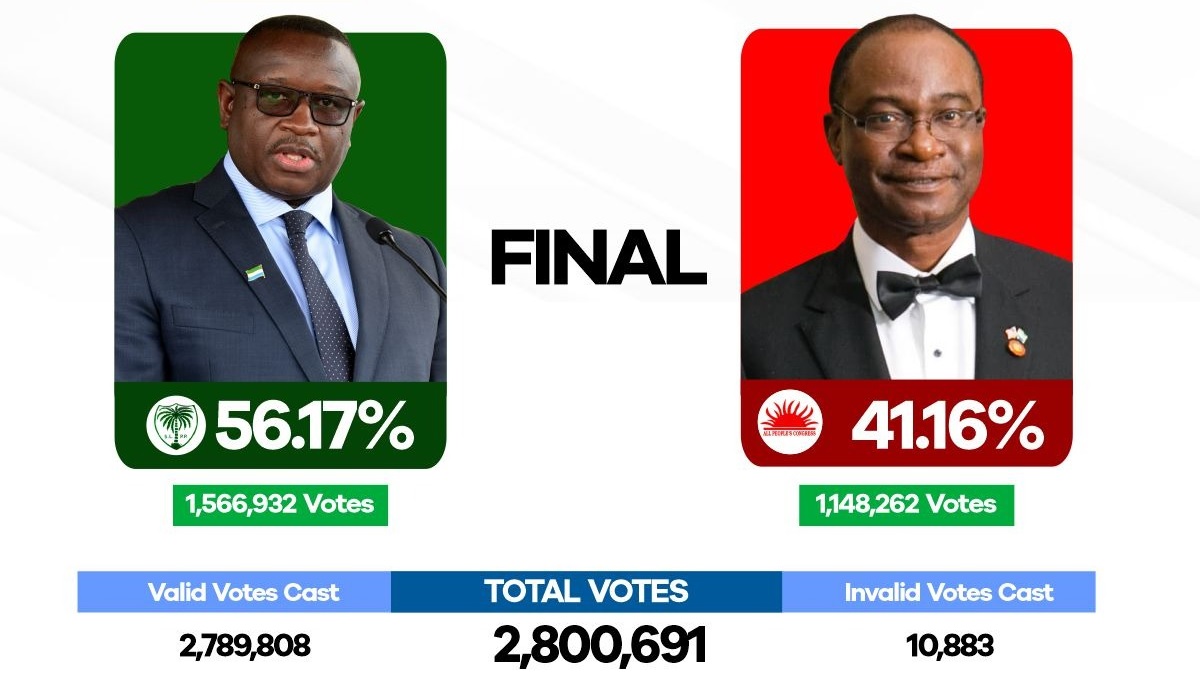In a recent press engagement held at the Electoral Commission for Sierra Leone (ECSL) headquarters in Freetown, Commissioner Abubakarr Koroma, representing the North, provided insights into the 3% difference between the National Election Watch (NEW) tally and the official results of the 2023 elections.
Awoko reports that Koroma sought to address the public’s concerns and clarify the reasons behind the discrepancy.
During the question-and-answer session on Monday, Koroma explained that the ECSL employed 11,832 polling station staff across the country, compared to NEW’s 700 polling staff. He highlighted that the estimated marginal difference between the two sets of results was only 6%.
“NEW gives an upper limit of 53.1% to the ruling SLPP party and 49.1% to the APC party,” Koroma stated during the briefing. He noted that during the 2023 elections, there were several challenges related to the Proportional Representation Voting System (PRVT), a system that has posed difficulties not only in Sierra Leone but globally.
Koroma pointed out that while NEW covered 700 polling stations, the ECSL covered 11,832 polling stations. NEW reported 53.1% for the SLPP, whereas the ECSL reported 56.1%, considering the entirety of the electoral process. He asserted that the marginal difference was only 3%.
“In my view, it would not have been a big problem for them, because it is just a 3% difference. We did more, but PRVT posed a serious challenge to all of these, not only in Sierra Leone but worldwide,” Koroma added.
The Commissioners acknowledged that electoral challenges related to PRVT are widely reported globally. “I’m not saying it is the same in Sierra Leone, but it happens,” Koroma remarked. They argued that not every observer is independent and that some might face challenges regarding the accuracy of results during elections.
Koroma disclosed that the 2023 election data does not account for the votes of security forces who only vote for the presidential candidate. He cited Kenya and Malawi as examples of African countries where election results were released but later overturned by the supreme court. Ranking both parties, Koroma noted that a sample may not be nationally representative. Another Commissioner stated during the conference that while ECSL has the disaggregated data, those aggrieved should seek redress in the supreme court if the law does not permit other actions.












Where is the evidence? Produce the results if you’re certain that you won the elections. Democracy will teach you how to respect the electorates who employed ECSL. There can never be peace without justice.
Well APC do em sef, why didn’t they go to court !!!. That finding justice in social media. Even America results are not perfect. Let alone, salone. And they depended on NEW. Wae eat 50% of money wae dem get from international community.
This is a product from the SLPP
Majority suffers in this country
God will never let those(supporters) people go free. Check your endings there starts your suffering onto next world
If you know the election results is not correct produce your own that is correct. Because I belive all politicial parties have representatives for all the pooling stations across the country and they were all given forms. So what is big deal in that.
Let thy will be done
Why the delay to report the result.
[…] ECSL Electoral Commissioners Defend 3% Discrepancy in 2023 Election Results […]